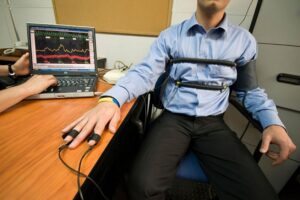Communist Party officials in the eastern Tibetan province of Sichuan are being forced to undergo polygraph, or lie detector, tests. The Chinese government claims that the tests, which have been conducted on more than 168 cadres since April, are being imposed in order to establish the “psychological stability” of officials in the region. The test is considered to be a part of “progressive training” and requires candidates to answer questions that will expose their true feelings and ideas.
The tests come in the wake of a rare disclosure by the Communist Party that revealed some cadres were secretly funding the Dalai Lama by sending donations to him. A 2016 report issued by Tibet’s discipline watchdog linked “15 party officials to alleged illegal overseas separatist organisations in 2014 who provided intelligence to the Dalai Lama clique and funded secessionist activities.” Wang Yongjun, head of the discipline watchdog, was quoted as saying that the officials involved were neglecting important political issues and the country’s anti-separatist struggle.
The move has been condemned by international human rights groups. The Washington based International Campaign for Tibet (ICT) said the tests exposed the heightened paranoia and mistrust in the Communist Party and said that the measures were intended to stifle dissent and further grasp control over its members. The ICT also stated that the tests were “an implicit acknowledgement that in the official sphere as well as in the wider society, many Tibetans remain loyal to the Dalai Lama and maintain their strong sense of identity as Tibetans.”
The instrument typically used to conduct polygraph tests consists of a physiological recorder that assesses three indicators of autonomic arousal: heart rate/blood pressure, respiration, and skin conductivity. Most examiners today use computerised recording systems. Rate and depth of respiration are measured by pneumographs wrapped around a subject’s chest. Cardiovascular activity is assessed by a blood pressure cuff. Skin conductivity is measured through electrodes attached to a subject’s fingertips.

Several questioning techniques are commonly used in polygraph tests. The most widely used format is the Control Question Test (CQT). The CQT compares responses to “relevant” questions, such as “did you donate money to the Dalai Lama?” with responses to “control” questions, like “did you have a cup of tea this morning?”
Some researchers are concerned that when wrong, the tests produce more false positives (meaning innocent people who wrongly fail) than false negatives (meaning guilty people who wrongly pass). Some people who are telling the truth can fail polygraph tests by trying too hard to control their body’s responses. “When truthful persons alter their physiology, thinking they will help themselves pass the polygraph, polygraph literature suggests that many of these truthful examinees are classified as deceptive when they do so,” said Walt Goodson, the President of the American Polygraph Association.




 Print
Print Email
Email